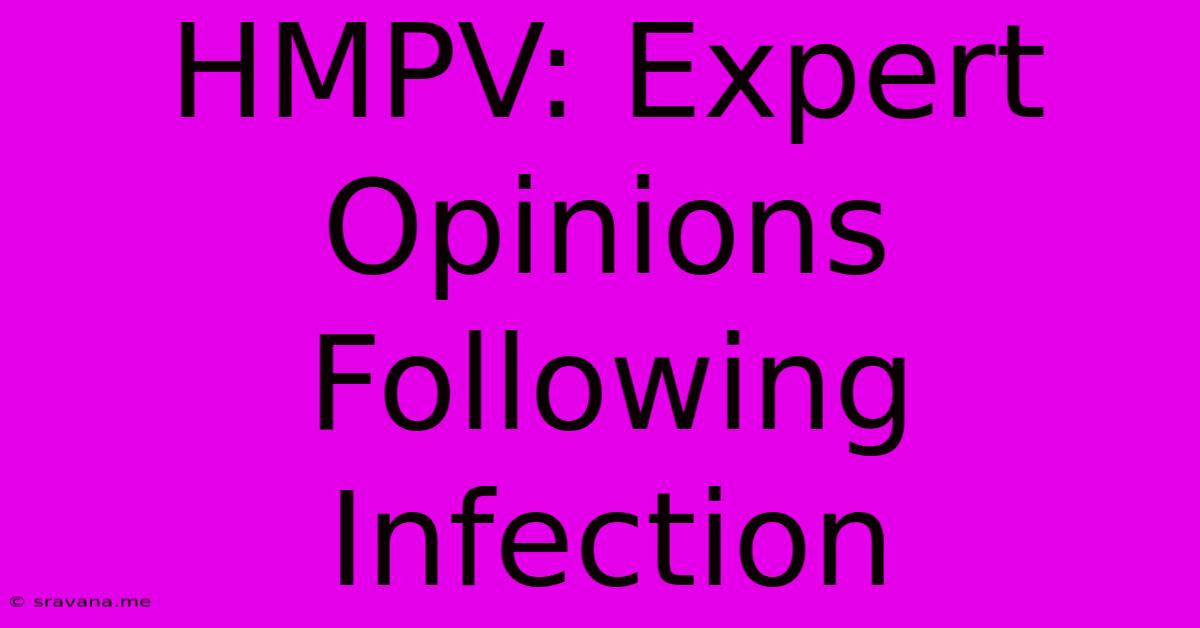HMPV: Expert Opinions Following Infection

Discover more detailed and exciting information on our website. Click the link below to start your adventure: Visit Best Website sravana.me. Don't miss out!
Table of Contents
HMPV: Expert Opinions Following Infection
Human metapneumovirus (HMPV) is a common respiratory virus that can cause a range of illnesses, from mild cold-like symptoms to severe pneumonia, particularly in infants, young children, the elderly, and those with underlying health conditions. Understanding HMPV, its effects, and post-infection care is crucial for both individuals and healthcare professionals. This article gathers expert opinions on managing HMPV infection and its aftermath.
Understanding HMPV and its Impact
HMPV is a significant respiratory pathogen globally. It's part of the Paramyxoviridae family, related to RSV (respiratory syncytial virus) and parainfluenza viruses. Transmission is primarily through respiratory droplets, produced when an infected person coughs or sneezes. Infections typically occur during colder months, mirroring the seasonal patterns of other respiratory viruses.
Symptoms of HMPV Infection
The symptoms of HMPV infection are similar to those of other respiratory illnesses, making diagnosis challenging without laboratory testing. Symptoms can range from mild to severe and may include:
- Upper respiratory symptoms: Runny nose, cough, sore throat, congestion
- Lower respiratory symptoms: Wheezing, shortness of breath, difficulty breathing, pneumonia
- Other symptoms: Fever, headache, muscle aches, fatigue
Severity varies significantly depending on factors such as age and pre-existing health conditions. Infants and young children are particularly vulnerable to severe lower respiratory tract infections, potentially requiring hospitalization. The elderly and immunocompromised individuals are also at higher risk of complications.
Expert Opinions on Diagnosis and Treatment
Early and accurate diagnosis of HMPV is crucial for appropriate management. However, because the symptoms overlap with numerous other respiratory viruses, definitive diagnosis often requires laboratory testing, such as PCR (polymerase chain reaction) or rapid antigen tests. These tests detect the virus's genetic material or antigens, respectively.
Treatment Approaches
Unfortunately, there is no specific antiviral treatment for HMPV. Management focuses on supportive care, aimed at relieving symptoms and preventing complications. This includes:
- Rest: Adequate rest is essential for recovery.
- Hydration: Maintaining adequate fluid intake helps prevent dehydration, particularly important with fever.
- Over-the-counter medications: Pain relievers (like acetaminophen or ibuprofen) can reduce fever and aches. Decongestants and cough suppressants may provide some relief, but should be used cautiously, especially in children.
- Oxygen therapy: In severe cases, oxygen therapy may be necessary to support breathing.
- Hospitalization: Hospitalization may be required for infants, young children, or individuals with severe symptoms requiring respiratory support, such as mechanical ventilation.
Long-Term Effects and Post-Infection Care
While most individuals recover fully from HMPV infection within a few weeks, some may experience lingering effects or complications. Expert opinions highlight the importance of post-infection monitoring, especially in high-risk groups.
Potential Long-Term Effects
Although rare, some individuals, particularly children, may experience wheezing or recurrent respiratory illnesses following HMPV infection. This highlights the potential link between HMPV and the development or exacerbation of asthma. Further research is needed to fully understand the long-term consequences of HMPV infection.
Post-Infection Monitoring and Management
Following an HMPV infection, close monitoring is essential, particularly for young children and vulnerable individuals. This may involve:
- Regular check-ups: Follow-up appointments with a healthcare professional can help assess recovery and identify any potential complications.
- Symptom management: Continued management of lingering symptoms, such as cough or wheezing, may be necessary.
- Prevention of secondary infections: Practicing good hygiene and avoiding exposure to other respiratory viruses can help prevent secondary infections.
- Asthma management (if applicable): For individuals with asthma, proper management of their condition is crucial to prevent exacerbations triggered by HMPV infection.
Prevention Strategies: Expert Recommendations
Prevention strategies are crucial to minimize the impact of HMPV. Experts emphasize the importance of:
- Vaccination: While there's currently no HMPV vaccine available, ongoing research is actively exploring vaccine development.
- Hygiene practices: Frequent handwashing, covering coughs and sneezes, and avoiding close contact with infected individuals are effective preventive measures.
- Environmental control: Improving ventilation in indoor spaces can reduce the spread of respiratory viruses.
Future Directions in HMPV Research
Ongoing research focuses on several key areas, including:
- Vaccine development: Development of an effective and safe HMPV vaccine is a high priority.
- Improved diagnostic tools: More rapid and accurate diagnostic tests are needed for timely and effective management.
- Understanding long-term effects: Further research is crucial to understand the long-term consequences of HMPV infection, especially in vulnerable populations.
- Therapeutic interventions: The exploration of novel antiviral therapies could potentially offer more effective treatment options in the future.
Conclusion: A Holistic Approach to HMPV Management
HMPV infection requires a comprehensive and individualized approach to management. While supportive care remains the cornerstone of treatment, ongoing research into prevention, diagnostics, and therapeutics is crucial to minimizing the burden of this common yet potentially serious respiratory virus. Close monitoring, particularly in high-risk groups, and adherence to preventive measures are essential in minimizing the impact of HMPV on individuals and public health. Expert opinions emphasize the importance of collaboration between healthcare professionals, researchers, and public health agencies in developing effective strategies to combat HMPV and improve patient outcomes. The continued investigation into the long-term effects of HMPV infection is particularly critical for developing targeted interventions and improving the long-term health of affected individuals.

Thank you for visiting our website wich cover about HMPV: Expert Opinions Following Infection. We hope the information provided has been useful to you. Feel free to contact us if you have any questions or need further assistance. See you next time and dont miss to bookmark.
Also read the following articles
| Article Title | Date |
|---|---|
| Notable Ces 2025 Product Releases | Jan 11, 2025 |
| Latest From Ces 2025 A Roundup | Jan 11, 2025 |
| Whats New At Ces Tech Event | Jan 11, 2025 |
| Top 10 Gadgets From Ces 2025 | Jan 11, 2025 |
| Watch Nhl Abc Espn Disney This Week | Jan 11, 2025 |
